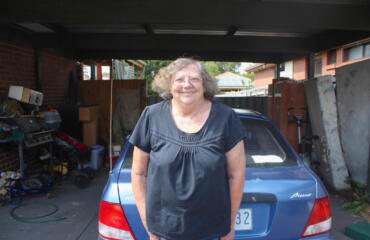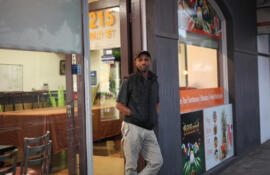Picture a woman in labour, alone, by a dried up river bank. The closest hospital is a two day walk away. Her baby is coming, but help isn’t.
This is the reality for around 43 per cent women in Papua New Guinea where a lack of access to health care facilities and to trained health workers sees women giving birth in circumstances like these, says Professor Caroline Homer – midwife, researcher, and director of the Centre of Midwifery, Child and Family Health.
Papua New Guinea has among the highest rates of maternal mortality in the world, with over 1500 women dying during childbirth annually. That’s 80 times the number of Australian women who die from the same causes.
“Maternal health mirrors the gap between rich and poor,” Homer said this week at “Leave No Woman Behind” – an event held by Melbourne’s Burnet Institute to recognise International Women’s Day, 8 March.
“Maternal mortality is higher in poor countries, in rural countries, and in less educated communities. Less than 1 per cent of the maternal deaths occur in high income countries,” she said.
Bleeding, infection, unsafe abortion, hypertension account for four in five maternal deaths in Papua New Guinea. “The sad reality is that most of these deaths can be prevented,” said Homer.
The Burnet event focused on maternal health across the world, with a specific focus on the institute’s flagship research project, “Healthy Mums, Healthy Babies” (HMHB).

Healthy Mothers, Healthy Babies research investigator Michelle Scoullar. Picture: Lynton Crabb, Burnet Institute.
HMHB was launched in 2015 when paediatrician Dr Michelle Scoullar made a solo journey to Kokopo – the capital of East New Britain. The project now employs 17 Papua New Guinean medical staff who run the longitudinal study, designed to paint a picture of maternal health in the country. The staff, employed and trained by the Burnet Institute, meet with 700 mother and baby pairs for five check ups over a year long period – first at the antenatal clinic, then at delivery, one month, six months and 12 months after the delivery.
At each meeting, the women complete a questionnaire about their mental and physical health. A number of biological swabs are also taken – urine, blood, vaginal specimens. The samples test for a variety of infections and treatment is provided when a problem is detected. Since 2015, the project has conducted over 1900 health questionnaires, 3000 checks for anaemia and has run almost 1000 STI checks.
“That’s what different about this project. We’re looking at a wide breadth of issues that affect pregnancy and we’re also following these women for a long period of time,” says Dr Scoullar, who is principal investigator on the project.
The collaborative research project is the first of its kind in PNG. It aims to make a blueprint for more effective government spending on healthcare throughout the country.
“There’s very little data in PNG that gives good information on maternal and newborn health. If we’re asking a government to spend their health dollars wisely, how do they know where to prioritise or which things should receive the biggest focus?” said Dr Scoullar.
Dr Scoullar is confident that the data collected throughout the project will not just benefit Papua New Guinea, but will inform healthcare spending for countries with similar health profiles throughout the world.
“This study is the beginning of a lot more,” she says.
Homer concluded the Burnet discussion with some reflections on the importance of investing in girls and women.
“When we invest in girls and women, everybody wins. Girls and women carry more than babies or water. They carry families, they carry businesses. They carry potential. When we invest in their health, rights and wellbeing, it creates a positive ripple effect that lifts up entire countries.
“Give girls and women access to health care, they will deliver more resilient families. Give girls and women the chance to learn, they will deliver more stronger communities and economies.
“Give girls and women opportunities, they will deliver the solutions. And when we invest in women and girls, no one will be left behind.”

Caroline Homer AO will be joining the Burnet Institute this year to continue her research on improving maternity care, midwifery practice and regulation and international development. Picture: Charlotte Grieve




